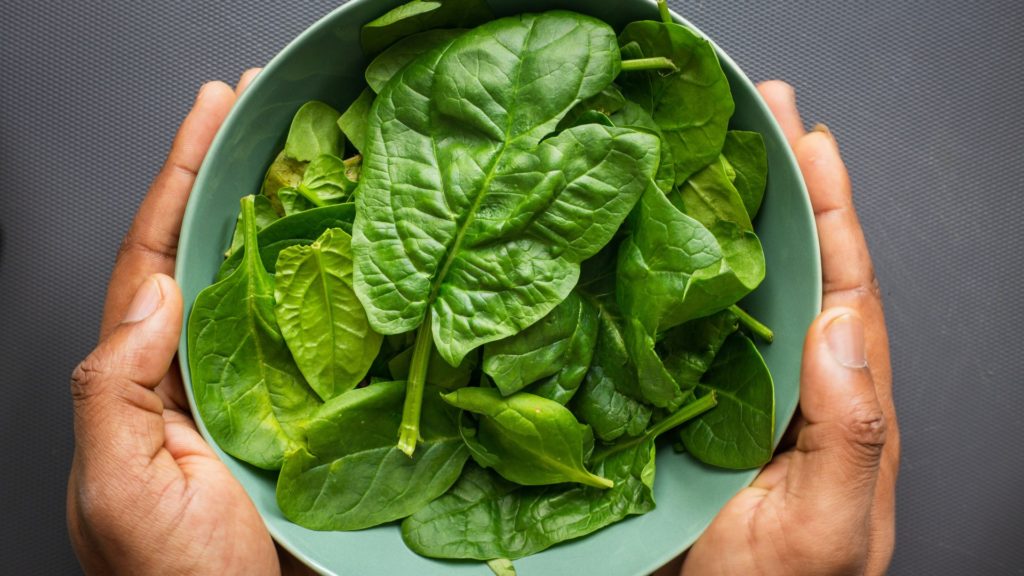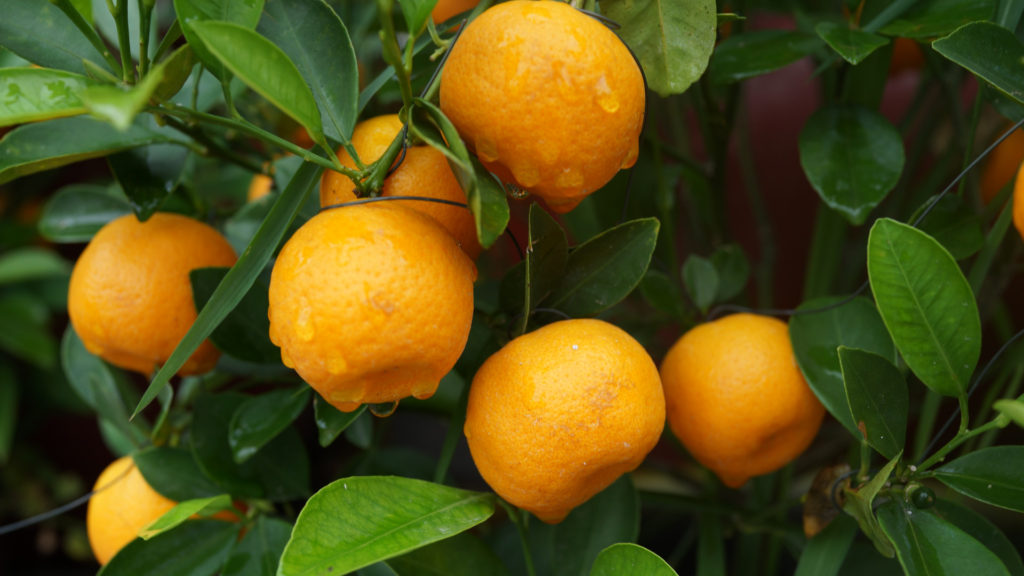As the cold embrace of winter settles in, the need to fortify our bodies against the chill becomes paramount. In this pursuit, Ayurveda, the ancient science of holistic well-being, offers a treasure trove of wisdom. Embracing the principles of balance and nourishment, Ayurveda directs us towards foods that can help us maintain equilibrium amidst the winter’s rigors, particularly focusing on harmonizing the vata dosha.
Here, we present five remarkable foods that can be your allies in enhancing immunity and vitality during the winter months.
1. Spinach
Spinach emerges as a beacon of health in winters. Known for its nutritional versatility and multitude of benefits, spinach extends its generosity to both skin and hair. Spinach are loaded with nutrients, including protein, iron, vitamins, and minerals, spinach is a testament to nature’s bounty.
There are numerous benefits of eating spinach everyday. Spinach benefits for skin and for hair are widely popular.

A rich source of vitamin K, spinach contributes to bone health by supporting the production of osteocalcin protein, a guardian of calcium within the bones. The abundance of vitamin A, vitamin C, vitamin D, dietary fiber, potassium, and magnesium further cements spinach’s status as a winter champion. It’s a guardian of eyesight, a promoter of immunity, and a custodian of healthy hair.
Spinach is a rich source of vitamin K which produces Osteocalcin protein responsible for stabilizing calcium in the bones throughout the body. Spinach is also a great source of calcium, vitamin C, vitamin D, dietary fibre, potassium and magnesium.
Spinach is responsible for improving eyesight and boosting the immune system because it contains a significant amount of beta carotene, zeaxanthin, lutein and chlorophyll.
Spinach is high in vitamin A which helps fight various kinds of bacterial and viral infections. Spinach is also vital for hair because it enhances sebum production which keeps hair moisturised and nourished. Needless to say vitamin A in spinach enhances the growth of cells & tissues, helps cellular growth of skin and hair. So people who are worried about the risk of hair loss should eat spinach in ample quantity.
Spinach provides the required levels of folate and magnesium in the body which generates metabolic energy for the body.
2. Carrot
Everyone knows the carrot benefits for skin and hair. Carrots contain significant amounts of antioxidants, nutrients and vitamins. Carrot is an excellent source of phytonutrient antioxidants like beta-carotene, alpha-carotene and lutein.
Carrots are considered wonder food for skin due to its large amount of beta carotene antioxidants which prevents the degeneration of skin cells and delays aging and finally gives you the glowing skin. Carrots have a valuable quantity of vitamin A which is very important for healthy cells and tissues.
Another factor due to which carrots are great for skin are vitamin C. It promotes skin growth and reduces acne or pimples or dark spots. In short, carrots are very important for healthy, flawless skin. Just like spinach, carrots are regarded as great for eyesight. Carrots are rich in vitamin A, lutein and lycopene which imparts healthy eyesight and improved night vision. Beta Carotene in carrots protects your eyes from the sun-damage.
Carrots are also good for people seeking a weight loss diet. Carrots have high portions of fibre (both soluble and insoluble fibres) which promotes a feeling of fullness and helps weight loss. The significant amount of fibers in carrots also keeps the digestive system healthy and prevents constipation and gas.
3. Orange
Oranges are an excellent source of vitamin C (80% of the daily need of vitamin C), thiamine, folate, and natural antioxidants which have multiple health benefits. Oranges are mainly composed of carbs and water, with very less portions of protein, fat and calories.
Another great thing about oranges is the presence of natural sugars such as glucose, fructose, and sucrose. Oranges have a low glycemic index (GI) which gives it numerous health benefits despite high sugar content. Oranges are made of high water content. 1 medium orange provides a half cup of water and oranges can provide 20% of the daily fluid needs. Fluid is very important for our body as 70% of our body is made of water and thus fluid supports all kinds of mental and physical metabolism, improves all kinds of circulation, flush out toxins & waste, and keep our body hydrated.

Vitamin C in orange supports immunity, produces collagen, reduces inflammation, and boosts cellular functions. Vitamin C in oranges helps boost the absorption of iron in the body which enhances oxygen availability in the blood circulation and gives the required energy to the body. Vitamin C also has anti-aging properties which helps DNA repair and muscle repair.
Oranges have ample amounts of potassium and folate which supports heart and muscular functions. Orange reduces blood pressure and supports the nervous system. Oranges also have smaller amounts of vitamin B, calcium, magnesium and flavonoid antioxidants. All of these have anti-inflammatory, antiviral, and antimicrobial properties which prevents the body against all kinds of oxidative stress.
4. Amla
Amla (Emblica Officinalis) is one of the three fruits of Triphala in Ayurveda. Known as wonderberry, it is a ‘Rasayana’ in Ayurveda and is known for its vitamin C content and antioxidant compounds.
Amla is one of the main ingredients of Chyavanprash. Amla is known to contain vitamin C in excellent quantities (the highest known concentrations of vitamin C in the plant). The natually found vitamin C quantity in amla is twenty times that of an orange. Amla (vitamin C) helps boost the immunity and prevents all kinds of known viral and bacterial ailments.
The antioxidants of amla helps decrease viral replication and reduces the viral propagation in the body. It also decreases all kinds of virus-induced oxidative injury which makes amla one of the best antioxidants for viral infections.
In terms of Ayurveda, amla pacifies all three kinds of doshas (vataa, pitta, and kapha), especially pitta dosha. Amla has excellent immunity booster properties and rejuvenates tissues throughout the body and builds ojas. It grants immunity and youthfulness, promotes energy and has remarkable effects on the arterial and the respiratory system.
5. Fenugreek
Fenugreek leaves are known as ‘Methi’ and come loaded with vitamins, minerals, fiber and phytonutrients. Fenugreek helps lowering cholesterol and blood sugar level. Another great reason to consume fenugreek is to boost testosterone (in men). Studies have shown that fenugreek increases libido and enhances male-reproductive system.
Fenugreek leaves also help in improving intestinal cholesterol absorption and enhances the production of cholesterol (fenugreek can increase production of good (HDL) cholesterol and reduce production of bad (LDL) cholesterol). People suffering from atherosclerosis and diabetes should consume fenugreek in large quantities.
Fenugreek has antioxidant properties which improves digestion, reduces gastrointestinal ailments, constipation, indigestion and all kinds of stomach pain. Fenugreek is very beneficial for colon and stomach ulcers. People suffering from intestinal inflammation and bowel syndrome should consume fenugreek on a regular basis.
Fenugreek leaves are also beneficial for heart (cardiovascular) health. Fenugreek reduces the risks of heart disease. Fenugreek reduces inflammation on cellular levels and can also be useful in kidney ailments and muscular pain.
It is important to eat winter fruits and vegetables for the proper functioning of body metabolism.
